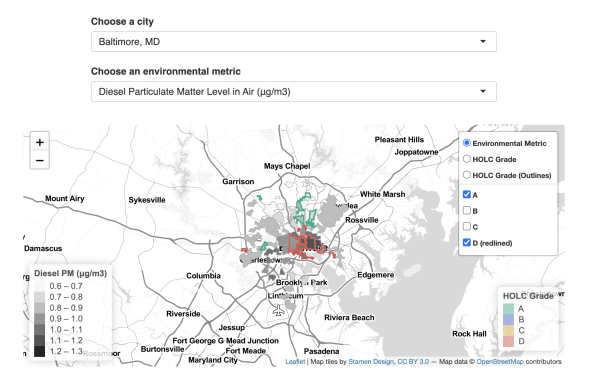From green spaces to tree canopy to clean air and water, the impact of historic redlining and other discriminatory policies continues to be hardwired into the built environment in many of our urban communities. Excluded from much-needed infrastructure investments, many communities of color and low-income communities continue to lack access to parks, tree-lined streets, safe recreational areas, and opportunities for social connection. As the climate crisis intensifies, the impact of this missing infrastructure is felt in nearly every aspect of day-to-day life, from the time you can spend outdoors, to increased utility rates, to more costly food production and worsening health conditions.

To effectively tackle these multidimensional environmental justice issues, policy solutions must simultaneously confront deeply-rooted systemic inequalities and account for the varied day-to-day experiences of the people living in the community. Through a partnership with the RAND Corporation, Groundwork Trusts helped illustrate the intersectional impact of environmental injustice on their communities, elevate how the combined use of data, storytelling, and community engagement can lead to more holistic programs, and demonstrate how policymakers can use these insights to make more impactful and sustainable decisions.
Illustrating the Path To Environmental Justice
Over the past five years, Groundwork Trusts have been using redlining maps to visualize the connection between divestment and present-day environmental issues and using this information to engage in community-wide conversations about equity, advocate for change, and design policy to meet multiple community needs. Through conversations with Groundwork Trusts and the Johns Hopkins Bloomberg School of Public Health, RAND translated these experiences into an interactive tool that visualizes the connections between historical redlining and current environmental indicators, such as health hazards, tree canopy coverage, and flood and heat vulnerability.
However, data is just one piece of the puzzle. Data must be deeply integrated with storytelling, community outreach, and relationship building to design environmental justice programs and policies that meet a community’s broad social, economic, and health needs. The Groundwork network exemplifies this by actively involving community members in inclusive decision-making processes, bridging the gap between data-driven policies and the genuine needs and aspirations of the community. Rather than imposing a one-size-fits-all solution, this model provides a blueprint for addressing equitable development in a holistic, sustainable way and with the greatest potential for impact.
Showcasing Models For Success
To demonstrate how data, storytelling, and community voice can be leveraged for transformative policy-making, RAND worked with Groundwork San Diego and Groundwork Elizabeth to highlight different approaches to implementing creative, community-led solutions. Each story captures the essential relationship between community organizations, residents, and leadership and shares best practices for others seeking to put environmental justice into action.
Chollas: A Story of Community Partnership and Environmental Justice
In San Diego, CA, Groundwork San Diego is working to revitalize the Chollas Creek watershed, which has suffered decades of pollution and neglect. The organization has engaged residents in restoration efforts and provided educational programs on the importance of water conservation and environmental stewardship. As a result, the Chollas Creek watershed has become a thriving ecosystem and a hub for outdoor recreation, providing a safe and enjoyable space for residents to connect with nature.
From the Ground Up: Environmental Justice in Elizabeth, New Jersey
In Elizabeth, NJ, Groundwork Elizabeth has implemented various initiatives to promote equitable development in the city. Through youth employment and leadership development programs, urban agriculture, and green infrastructure projects, the organization has created new opportunities for community members to engage with environmental issues and take ownership of their local environment.
By harnessing the potential of data and the united strength of community, Groundwork Trusts are shining a beacon of hope. They showcase that impactful and meaningful change is not only within reach but is already in motion. As we work to advance environmental justice efforts, let us draw inspiration from the remarkable progress already being made and recognize that collectively we can forge a path toward an equitable and inclusive future for all.

